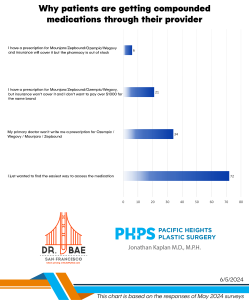
A friend recently asked me if I do hair transplants in my plastic surgery practice. I told him that I do not even though it was part of my training in plastic surgery. He asked if I could help him do the research in finding a hair transplant surgeon for himself, and I obliged.
What I quickly learned is that most hair transplant surgeons have never finished an accredited residency. I’m not saying they haven’t completed a hair transplant accredited residency – I mean they’ve never finished a residency of any kind! I just assumed that the people out there doing hair transplants learned how to do it during their plastic surgery residency, like me, or during a facial plastics or dermatological residency.
But that’s not what’s happening. Look closely at the “About the Doctor” section on a hair restoration doctor’s website. They usually mention that they did a year or so of some residency but didn’t complete the entire residency. This is enough to get a medical license, but not enough to complete training in their field of choice. And when you don’t complete a residency, you can’t become board certified in that field.
Other things to look for on their site is mention of a fellowship in hair restoration. But these aren’t the same accredited fellowships that your heart surgeon or kidney specialist completed. A hair restoration fellowship isn’t recognized by the American Board of Medical Specialties (ABMS) which confers legitimacy on your surgeon, cardiologist or primary care doctor. You may see membership in the American Board of Cosmetic Surgery but again, this isn’t recognized by most State medical licensing boards or the ABMS. (leave a comment with a doctor’s website if you’d like me to review and “translate” what their listed credentials really mean!)
Doctors that haven’t finished a residency or any type of formal training lack the fundamental knowledge associated with infection, wound healing and comorbid conditions (ie who might have a heart attack during a procedure because their medical history of high blood pressure and diabetes wasn’t considered). But that doesn’t keep them from taking a weekend course on hair transplantation. You may argue that they still ultimately receive training during the 3-day course but let’s get back to the underlying question…why didn’t they finish their residency? Why didn’t they complete the fundamental education that we expect from our doctors?
So why the rush now to become a hair transplant surgeon? First, the technique has improved. It no longer requires a huge scar in the back of the scalp to harvest the hair follicles prior to implanting them into balding areas. More and more doctors are learning the technique with a NeoGraft or SmartGraft machine which avoids surgery in the typical sense.
The other change is the shift of doctors away from the complex world of insurance-based medicine to a cosmetic/cash-pay practice. As a result, doctors find a field that isn’t “owned” by another specialty and gravitate towards that field. For example, heart disease is owned by cardiologists. Just like breast reconstruction is owned by plastic surgeons. Conversely, hair transplant surgery is sort of nebulous and can be done by plastic surgeons and dermatologists, and apparently anyone that has a medical license!
I’m not saying these doctors are bad people but I do think it’s important to consider what it was that pushed them off the natural course of education and training and into an unregulated and unsupervised specialty. For argument’s sake, let’s say they took that weekend course and now have 20 years of experience. Experience is important. And I would look past their questionable path to becoming a hair transplant surgeon if they had that much experience and a large number of before and after photos on their site. But if anything untoward occurs during or after your procedure that you perceive to be less than honorable, will you say, “I should’ve seen this coming”?
In the end, I’m conflicted about what makes a doctor qualified to be a hair transplant surgeon that I would trust. Before my research, I’d say you should find a doctor that completed a residency/fellowship in dermatology, plastic surgery or facial plastic surgery (fields that are exposed to hair restoration during their training) and perform hair transplants in their private practice. But after reviewing so many websites with doctors that didn’t even finish a residency of any sort, board certification in any specialty recognized by the American Board of Medical Specialties (which the American Board of Cosmetic Surgery is not), combined with years of experience is an absolute must. I don’t perform hair transplants but maybe I should. Maybe I would be the right doctor for ambivalent consumers, such as myself, that are out there looking for the whole package – training, experience and recognized board certification.
Click here for the original blog post written by Dr. Jonathan Kaplan for BuildMyBod.




